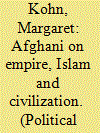| Srl | Item |
| 1 |
ID:
088372


|
|
|
|
|
| Publication |
2009.
|
| Summary/Abstract |
This essay provides an interpretation of Sayyid Jam l ad-D n al-Afgh n , a controversial figure in nineteenth-century Islamic political thought. One aspect of this controversy is the tension between "Refutation of the Materialists," Afgh n 's well-known defense of religious orthodoxy, and a short newspaper article entitled "Reply to Renan" that dismisses prophetic religion as dogmatic and intellectually stifling. In this essay I argue that close attention to Afgh n 's theory of civilization helps resolve this apparent contradiction. Afgh n 's interest in Ibn Khald n and the French historian Guizot is well known, but has not been fully explored in the literature. I suggest that understanding Guizot's distinctive approach to the concept of civilization illuminates Afgh n 's writings on the political utility of religion. Afgh n was an ardent anti-imperialist and his goal was to encourage reform in Islamic countries while resisting Western hegemony. He concluded that the tension between prophetic religion and critical thought could help Islamic civilization to flourish.
|
|
|
|
|
|
|
|
|
|
|
|
|
|
|
|
| 2 |
ID:
088371


|
|
|
|
|
| Publication |
2009.
|
| Summary/Abstract |
This essay lays out the common reasoning underlying a diversity of arguments for decision making using lotteries. This reasoning appeals to the sanitizing effects of ignorance. Lotteries ensure that bad reasons are unable to affect a decision. (They also ensure that good reasons have no effect as well, which is why care must be applied in deciding to use them.) All arguments for or against the use of a lottery to make a particular decision will thus appeal to the same property that lotteries possess. This fact is compatible with continued vigorous disagreement about whether particular decisions should be made by lot. Such disagreements, however, will focus on the nature of the circumstances surrounding the decision. People can thus agree that a given set of circumstances calls for the use of a lottery even as they disagree over whether those circumstances hold
|
|
|
|
|
|
|
|
|
|
|
|
|
|
|
|
| 3 |
ID:
088370


|
|
|
|
|
| Publication |
2009.
|
| Summary/Abstract |
Both Ralph Waldo Emerson's and W. E. B. Du Bois' firstborn sons tragically died at very young ages. Drawing from the essays where they write about their grief, I explore Du Bois' "subversion" and "revision" of Emerson's thought by contrasting their visual metaphors: Emerson's "focal distancing" and Du Bois' practice of "second sight" and seeing through "the Veil." I show how the disruptive particular event of the deaths of their sons causes both to challenge the idealist elements of their respective gazes. I draw upon Theodor Adorno to explore the larger lessons of these reconsiderations. In recognizing the seductive dangers of the idealist gaze and the value of the disruptive particular, Adorno explicitly theorizes what Emerson and Du Bois also come to appreciate, in a less overt way, in their moments of loss.
|
|
|
|
|
|
|
|
|
|
|
|
|
|
|
|
| 4 |
ID:
088369


|
|
|
|
|
| Publication |
2009.
|
| Summary/Abstract |
The pathologies of the democratic public sphere, first articulated by Plato in his attack on rhetoric, have pushed much of deliberative theory out of the mass public and into the study and design of small scale deliberative venues. The move away from the mass public can be seen in a growing split in deliberative theory between theories of democratic deliberation (on the ascendancy) which focus on discrete deliberative initiatives within democracies and theories of deliberative democracy (on the decline) that attempt to tackle the large questions of how the public, or civil society in general, relates to the state. Using rhetoric as the lens through which to view mass democracy, this essay argues that the key to understanding the deliberative potential of the mass public is in the distinction between deliberative and plebiscitary rhetoric.
|
|
|
|
|
|
|
|
|
|
|
|
|
|
|
|